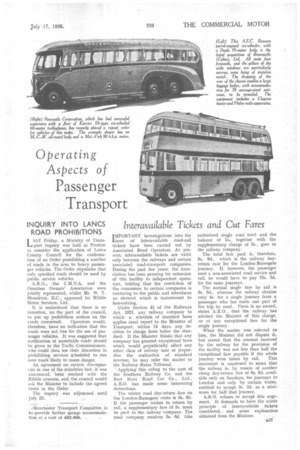Operating Aspects of
Page 47

If you've noticed an error in this article please click here to report it so we can fix it.
Passenger Transport
INQUIRY INTO LANCS ROAD PROHIBITIONS
I AST Friday, a Ministry of Transla port inquiry was held at Preston to consider the application of Lancs. County Council for the confirmation of an Order prohibiting a number of roads in the area to heavy passenger vehicles. The Order stipulates that onlyspecified roads should be used by public service vehicles.
A.R.O., the C.M.U.A, and the Omnibus Owners' Association were jointly represented, whilst Mr. W. T. Monckton, K.C. appeared for Ribble Motor Services, Ltd.
It is understood that there is no intention, on the part of the council, to put up prohibition notices on the roads concerned. Operators would, therefore, have no indication that the roads were not free for the use of passenger vehicles. It was suggested that notification of unsuitable roads should be given to the Traffic Commissioners, %silo could then use their discretion in prohibiting services scheduled to run over roads likely to cause danger. An agreement on certain discrepancies in one of the schedules had, it was announced, been reached with the Ribble concern, and the council would ask the Minister to include the agreed items in the Order.
The inquiry was adjourned until July 23.
.:(Manchester Transport Committee is to provide further garage accommodation at a cost of £82.000, I MPORT ANT investigations into the issue of interavailable road-rail ticketS have been carried out by Associated Road Operators. At present, interavailable tickets are valid only between the railways and certain associated road-transport companies. During the past few years, the Association has been pressing for extension of this facility to independent operators, holding that the restriction of the concession to certain companies is confusing to the public and introduces an element which is tantamount to fare-cutting.
Under Section 41 of the Railways Act, 1921, any railway company to which a schedule of standard fares applies must report to the Minister of Transport, within 14 days, any decision to charge fares below the standard. If the Minister thinks that any company has granted exceptional fares which would prejudicially affect any other class of railway user or jeopardize the realization of standard revenue, he may refer the matter to the Railway Rates Tribunal.
Applying this ruling to the case of the Southern Railway Co. and the East Kent Road Car Co., Ltd., A.R.O. has made some interesting deductions . The winter road day-return fare on the London-Ramsgate route is 6s. 6d. If the passenger wishes to return by rail, a supplementary fare of 3s. must be paid to the railway company. The road company receives 5s. 6d.. (the authorized single road fare) and the balance of is., together with the supplementary charge of 3s., goes to the railway company.
The total fare paid is, therefore, 9s. 6d., which is the railway dayreturn rate for the London-Ramsgate journey. If, however, the passenger used a non-associated road service and rail, he would have to pay 15s. 3d. for the same journeys.
The normal single fare by rail is 9s. 9d., whereas the railway obtains only 4s. for a single journey from a passenger who has made one part of the trip by road, There is no record, states A.R.O., that the railway has advised the Minister of this charge, or of any exceptional fare for the single journey.
When the matter was referred to him, the Minister did not dispute it, but stated that the amount received by the railway for the provision of the facility was not less than half the exceptional fare payable if the whole journey were taken by rail. This statement is construed to mean that the railway is, by reason of another cheap day-return fare of Gs. 6d. available only on Sundays, for journeys to London and only by certain trains, entitled to accept 3s. 3d. as a minimum for half that journey.
A.R.O. refuses to accept this argument. It demands to have the whole principle of interavailable tickets considered,, and some explanation obtained from the Minister.




















































































